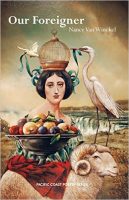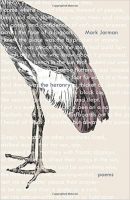January 20, 2017
Edited by David Sanders
Specimen Days
1654 Michiel de Swaen, South Netherland physician/poet, is born.
1850 Adam Oehlenschläger, Danish poet (b. 1779), dies.
1873 Johannes V Jensen, Denmark, novelist/poet (Energy Storage, Nobel 1944), is born.
1926 Jamiluddin Aali, Pakistani poet, essayist and columnist, is born.
1950 Edward Hirsch, American poet, is born.
1962 Robinson Jeffers, poet/playwright (Dear Judas), dies at 75.

The day was clear, unnaturally clear,
like a freshly wiped pane of glass,
a window over the water,
and blue, preternaturally blue,
like the sky in a Magritte painting,
and cold, vividly cold, so that
you could clap your hands and remember
winter, which had left a few moments ago—
if you strained you could almost see it
disappearing over the hills in a black parka.
Spring was coming but hadn't arrived yet.
I walked on the edge of the park.
—from “Late March” by Edward Hirsch
“The day was clear, unnaturally clear, / like a freshly wiped pane of glass” – Edward Hirsch
World Poetry
Read The Smog-Inspired Poem That China Can't Stop Talking About
A poem written by a Chinese surgeon lamenting the medical effects of smog, called "I Long to Be King," is going viral on Chinese social media. Told from the perspective of lung cancer, the poem takes an apocalyptic note.
In Praise of Air: A Poem that 'Cleans' Environment
A revolutionary air-cleansing poem has removed more than two tonnes of pollution from the environment in the UK as part of a project which could be used to fight pollution in cities across the world, a leading British University claimed on Friday. 'In Praise of Air', the world's first air-cleansing poem, was produced by scientists and writers at the University of Sheffield in the UK.
Emperor’s Poem Recited at Reading
The New Year’s Poetry Reading Ceremony was held at the Imperial Palace in central Tokyo on Friday. The Emperor composed a poem about his memory of listening to tree crickets singing during his stay at the Imperial Villa in Nasu, Tochigi Prefecture, in September 1999.
The Emperor of Japan composed a poem about his memory of listening to tree crickets singing in Nasu.
Recent Reviews
Memorable Speech: On J. D. McClatchy’s “Sweet Theft: A Poet’s Commonplace Book”
by Isaac Nowell
Perhaps unsurprisingly, it is not easy to review a commonplace book, or even to define it. The Oxford English Dictionary is periphrastically unhelpful: “a book in which ‘commonplaces’ or passages important for reference were collected, usually under general heads; hence, a book in which one records passages or matters to be especially remembered or referred to, with or without arrangement.” This certainly describes J. D. McClatchy’s recent addition to the tradition, although it could describe a lot of things.
Geoffrey Hill’s Ibsen
by Karl O’Hanlon
Geoffrey Hill’s ‘verse translation’ of Henrik Ibsen’s Peer Gynt was the last non-critical work to be published in his lifetime. The Penguin Classics volume publishes it alongside Hill’s version of Brand, commissioned by the National Theatre and performed in April 1978. The volume also contains an interview with Kenneth Haynes on issues around recreating Ibsen. In the interview, Hill reveals that he was blocked on writing Peer Gynt for two years, before a chance re-encounter with W.B. Yeats’s fourteeners in The Green Helmet provided him with a sense of possibilities for long lines (p. 344).
Stevie Smith, All the Poems
by Florian Gargaillo
The poem may be just two lines long, yet anyone familiar with her work will immediately recognize Stevie Smith as the author:
I’ll have your heart. If not by gift, my knife
Shall carve it out; I’ll have your heart, your life.
The rhythm is both meandering and coiled; the vocabulary simple yet pointed; the tone flat but also dramatic, making a drama of restraint. The poem’s surprises—of which there are many, compressed into a single couplet—depend on the reader’s willingness to read the poem aloud, fulfilling its potential as a spoken performance. Smith moves unexpectedly from short to long clauses (pulling us across an enjambment), and back again. “Gift” sharpens into “knife,” only to cut against “life.” And in an odd grammatical turn, a semicolon locks two sentences into one after the morbidity of the speaker’s possessiveness has been made clear and thus inescapable.
The Measure of Anger: On Alice Notley’s “Benediction”
by Steven Zultanski
The question of measure was at the forefront of “New American” poetic thought in the 1960s, when experimentation ushered in abstraction, colloquial language, collage, and uneven rhythms. Robert Creeley understood measure to be the potentially unruly rhythm and music of language as it flows through the poet in the act of writing. It is both a highly individualistic concept (related to the language patterns of a particular person), and an abstract and impersonal force (related to the movement of language as it exceeds intention). Thus “measure” in this context is distinct from meter; it intimates the particular rhythm of a poet, as opposed to a set pattern of syllables and stresses.
Urgent Missives
by Benjamin Hollander
Julien Poirier’s gambit in his recent City Lights collection, Out of Print, is that poetry survives and continues to evolve both as an art and as a way of life. In Poirier’s case, both life and art drag on in the suburban subdivisions and money-cratered cities of twenty-first-century California. Like that state, the surface of this poetry shimmers pleasantly with narrowly evaded disaster, with “absurd good news,” as the title of his previous book has it. But evidently, all that good news cannot last long.
Julien Poirier’s gambit in his recent collection, Out of Print, is that poetry survives as an art and as a way of life.
Broadsides
Beyond Autobiography: Claudia Emerson Through Three Poems on Race
by Philip Belcher
Claudia Emerson did not write many poems about race. In fact, in the seven collections she published between 1997 and 2015, only three poems appear that explicitly address the topic. The poems for which Emerson is best known—perhaps a majority of the poems in these seven books—employ a voice that is, or feels to the reader to be, autobiographical. There is, particularly now only two years removed from Emerson’s death, a powerful temptation to let her biography overshadow the strength of her poems. One can find easily in the poems reflections of the poet’s childhood and adolescence in rural Virginia, her tenures as the academic dean of a girls’ school and a rural mail carrier, the end of her first marriage, deaths of her father and brother, her second marriage, and the dread and courage with which she faced the cancer that caused her death at 57 on December 4, 2014.
The Best Job on Earth: On the Poetry of C. D. Wright
by Brian Teare

On January 12th, 2016, C. D. Wright passed away at the age of 67. Below, Brian Teare remembers Wright and pays tribute to her work and legacy.
Brian Teare remembers C.D. Wright and pays tribute to her work and legacy.
Drafts & Fragments
Fighting Poets Or Hamster? Amherst College Picks 30 Mascot Semifinalists
by Sam Hudzik
Amherst College has narrowed its list of possible mascots from 588 to 30. The college last year scrapped its longtime unofficial mascot, the Lord Jeffs. The old mascot was based on Lord Jeffrey Amherst, the namesake of the town who also wrote letters suggesting biological warfare against Native Americans. Amherst College formed a mascot committee and accepted nominations. Not making the cut: The Biddys (or Biddies), after the college’s president, Biddy Martin; or The Frosts, after Robert Frost — who taught at the school.
One of Amherst College’s possible new mascots is “The Fighting Poets.”
Poetry In the News
Obama and Biden Quote Irish Poets in Emotional Speeches
Barack Obama and Joe Biden both quoted Irish poets in their speeches at the ceremony honouring Biden with the Presidential Medal of Freedom in Washington DC on Thursday.
2016 TS Eliot Prize Won by Jacob Polley's 'firecracker of a book'

Jacob Polley has won the 2016 TS Eliot prize with Jackself, a collection described by the judges as “a firework of a book”.
Jacob Polley has won the 2016 TS Eliot prize with Jackself, a collection described by the judges as “a firework of a book”.
New Books
Protection Spell: Poems by Jennifer Givhan
[Paperback] University of Arkansas Press, 76 pp., $17.95

In Protection Spell Jennifer Givhan explores the guilt, sadness, and freedom of relationships: the sticky love that keeps us hanging on for no reason other than love, the inky place that asks us to continue revising and reimagining, tying ourselves to this life and to each other despite the pain (or perhaps because of it). These poems reassemble safe spaces from the fissures cleaving the speaker’s own biracial home and act as witnesses speaking to the racial iniquity of our broader social landscape as well as to the precarious standpoint of a mother-woman of color whose body lies vulnerable to trauma and abuse. From insistent moments of bravery, a collection of poems arises that asks the impossible, like the childhood chant that palliates suffering by demanding nothing less than magical healing: sana sana colita de rana, si no sanas hoy, sanas mañana (the frog who loses his tail is commanded to grow another). In the end, Givhan’s verse offers a place where healing may begin
Vagrants & Accidentals by Kevin Craft
[Hardcover] University of Washington Press, 128 pp., $19.9
Vagrants & Accidentals, the second full-length collection from poet Kevin Craft, is part vade mecum, part songbook, whose taut lines and adaptable stanzas traffic in the personal effects of emigration and estrangement, exile and return. In ornithology, a vagrant or accidental is a bird that appears out of its natural or normal range, blown off course by a storm, or inadvertently introduced into a new environment by human trade. Likewise, Craft is interested in things taken out of context―Greek myths in the Pacific Northwest, the potsherd or megalith stranded in a museum, excess carbon in the atmosphere, American pop songs in a Roman piazza, adoptions, estrangements, dangerous migrations, the constant shuffle of human beings from place to place―asking how we reorient ourselves in the crossfire of constant, rapid, global transformation
Our Foreigner by Nance Van Winckel
[Paperback] Beyond Baroque Books, 103 pp., $18.00

Poems “funny, stark, spot-on and utterly beautiful” comprise her collection, "Our Foreigner", “a brilliant and dark comedy.” This is Betsy Sholl’s apt description for the poetry of Nance Van Winckel, one of the Northwest’s foremost poets and writers, and her latest release—from The Pacific Coast Poetry Series/Beyond Baroque Books. Van Winckel’s own relatives traveled west enduring the hardship and tests of character that confronted those who made such treks in the 1800's. "Our Foreigner" explores, among other conditions and anomalies, ideas of journey, progress and regress, travel both physical and psychological. A variety of voices populate this collection, speakers from the past, or bright, sassy, contemporary folks talking as if all they have to do is open their mouths and out flies poetry. They manage, these poems, to be at once plain-speaking and brainy, lucid and deeply mysterious.
https://www.amazon.com/Our-
Mr. Stevens' Secretary: Poems by Frances Schenkkan
[Paperback] University of Arkansas Press, 70 pp., $17.95
In Mr. Stevens’ Secretary, a fictional assistant to Wallace Stevens juggles her roles as a mother, a wife, a believer, and a working woman. Privy at times to the famous poet’s personal life, the secretary must balance her curiosity about Stevens with her commitment to her husband, her faith, and the life she desires.
The Heronry by Mark Jarman
[Paperback] Sarabande Books, 88 pp., $14.95

Ordinary people seek connections to the natural world and each other in the poems of The Heronry, a collection that presents a series of spiritual encounters in the form of praise poems, lyric portraiture, and meditations on faith and belief.
In “Protection Spell” Jennifer Givhan explores the guilt, sadness, and freedom of relationships.
Correspondences
In England, An Effort To Preserve Ancient, Epic Assyrian Poetry
by Alice Fordham

When I meet Nineb Lamassu at England's Cambridge University, where he's a researcher, he transports us to his Middle Eastern homeland by opening his computer and playing me a recording of a man reciting a poem. Somewhere between speech and song, the voice is old, a little gruff, rising and falling rhythmically. Even in Aramaic — I don't speak a word of Aramaic — the effect is hypnotic. This is the traditional epic poetry of the Assyrian ethnic minority. Thousands of years ago, their empire dominated the Middle East, spreading out from what is now northern Iraq.
Marcelo Morales
by Kristin Dykstra
Marcelo Morales, born nearly twenty years after Cuba's 1959 revolution, is younger than many island writers whose works have been translated and circulated abroad. Part of his acclaim is his willingness to addresses the twenty-first century in prose poetry that boldly takes on both public and private aspects of Cuban history. His newest poetry collection, El mundo como ser (The World as Presence, University of Alabama Press, 2016), appears deceptively straightforward as compared to Cuba's writerly tradition, which is so rich in stylistic complexity.
The Rumpus Interview with Dawn Lundy Martin
by Julie Marie Wade
In November 2015, the Miami-based literary arts organization Reading Queer brought a group of queer-identified writers to present their work at a series of events co-sponsored by the Miami Book Fair International. Neil de la Flor, a friend and fellow poet and one of RQ’s founders, generously solicited my input on writers we should invite to come. In a response that preceded conscious thought, the first name to leap from my tongue—instinctively, reflexively—was Dawn Lundy Martin.
The PEN Ten with Camillle Rankine
by Hafizah Geter
In this week’s PEN Ten, guest editor Hafizah Geter, Content Editor and Publicity Coordinator at Poets House, speaks with Camille Rankine.
Hafizah writes: There are some writers you wait for. From the moment I read Camille Rankine’s chapbook Slow Dance with Trip Wire, I knew she would be one of them. I waited for her poems to come out in journals before reading and studying them voraciously. I waited for her full-length poetry collection Incorrect Merciful Impulses to come out from Copper Canyon before reading it from cover to cover. And as you read this, I’m tapping my foot expectantly waiting for her next book.
Cambridge University researcher Nineb Lamassu is working hard to preserve ancient Assyrian poetry.
Envoi: Editor’s Notes
Lessons from the Past: Anne Sexton

I remember Ralph Mills talking about my dead brother whom I've written about. And I met Ralph and I said, "Ralph" —this was a critical essay he'd written— "Ralph, I had no brother, but then didn't we all have brothers who died in the war?" Which was the Second World War, which is a long, a few wars ago. But didn't we all, somehow, have brothers? But I write my brother, and of course he believes it. I mean, why not? Why shouldn't he? But I was just telling him, incidentally, there was no brother. So, that kind of. . . I should say, "Excuse me, folks, but no brother," but that would kind of ruin the poem, so. . .
—from American Poets in 1976 edited by William Heyen
“Didn’t we all have brothers who died in the war?” – Anne Sexton